

Read 2 Grow Early Learning Child Care
Read 2 Grow Early Learning Child Care based on Nollamara provides a safe & nurturing environment to your kids.
Read 2 Grow Early Learning Child Care. Our world-renowned literacy program “Jolly Phonics” is why many parents choose Read 2 Grow. With accredited “Jolly Phonics” trainers we use is an age-appropriate multi-sensory approach, that introduces and encourages a lifelong love of reading. The program includes learning that links sounds to letters (phonics) through stories, actions, songs and craft. As your child gains confidence, they will learn how to sound out words and start the journey towards becoming independent readers. Founded in 1987, the Jolly Phonics materials are used for the teaching of literacy and music skills in more than 100 countries on five continents.
Some have even adopted Jolly Phonics as government policy. Jolly Phonics uses the synthetic phonics method of teaching letter sounds for reading and writing in a way that is fun and multi-sensory. Research indicates the early introduction of literacy gives children a flying start to their education. Read 2 Grow Early Learning Child Care. There are many reasons to choose an accredited, state of the art centre like Read 2 Grow. Our curriculum is literacy-based, multi-sensory and fun.
Everything we do is designed to ensure your child gets the best start in life and is fully prepared for school. Here are 9 more reasons why parents choose Read 2 Grow: A purpose-built, new concept in child careGives your child the best start in life with our world-renowned, play-based early literacy program (see below for details)Age appropriate learning areas 0-5 yearsExperienced and fully qualified staffWarm and loving environment where they are cared for like homeState of the art security technologyThe latest outdoor play areas to inspire their imaginationLimited places in Baby, Toddler, Pre-Kindy and Kindy rooms, so your child gets personalised carePlus, to celebrate our grand opening, you have the chance to WIN FREE CHILD CARE for 2020!
Read 2 Grow Early Learning Child Care. Dealing with Lactose Intolerance in Babies - Read 2 Grow. 6 Best Ways to Manage your Child's Anger - Read 2 Grow. Building Relationships with Early Childhood Educators - Read 2 Grow. Conversation Skills For Children: Learning to Talk and Listen to Others - Read 2 Grow. Getting your Child Ready for Child Care - Read 2 Grow. Are you telling stories with your children - Read 2 Grow. Is it just a Cough or is it Croup - Read 2 Grow. How to Recognise and Deal with Gagging in Babies/Toddlers - Read 2 Grow. How to Recognise and Deal with Gagging in Babies/Toddlers - Read 2 Grow. Read 2 Grow Early Learning Child Care. Protecting your Baby from SIDS (Sudden Infant Death Syndrome) “Giving Up Dummy” – It Needn’t be a Nightmare. “Giving up dummy” – many parents’ fears If your child has been using a dummy (comforter), sooner or later this will need to stop.

This is sometimes a bit of a challenge but true behavioural nightmares and tantrums are very rare. Below you’ll find some ideas that might help as you approach this milestone, though let’s deal with some myths first. The dummy and myths There are lots of ideas about the dummy that seem to have little foundation in either science or large-scale experience. All children use a dummy. “Giving up dummy” – the how Taking a deep breath is often the first trepidatious start for parents when removing a dummy but there are some very easy things you can do to help reduce or eliminate tantrums: start reducing, slowly at first then building up, the number of hours the dummy is available to your child during the day.
Challenges in “giving up dummy” Significant troubles here are very rare. Some children might experience a few restless nights however, these will usually soon pass. The Importance of Working Together when Parenting - Read 2 Grow. Why is working together when parenting important?
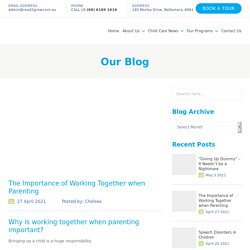
Bringing up a child is a huge responsibility. Every parent or couple needs to decide how best to go about that. Solutions may vary from one couple in a particular environment to another. Of course, single-parent challenges are different again. Here we’ll share some ideas based around couples and their communications. Children and certainty Children need to feel secure and as part of that, they value certainty and familiarity. If fundamentally different approaches are adopted by one parent to the other, that can introduce uncertainty and confusion into the child’s life. Early Learning Child Care Nollamara. How to identify possible speech disorders in children Most adults who do not know a child should be able to understand 75-95% of what the youngster is saying by the time the child gets to the age of 3-3.5 years.
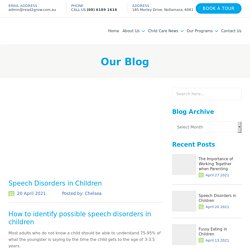
At that age, the child will still most likely be making numerous sound errors and some of their pronunciation may be off in many cases. Even so, they should be able to communicate clearly. Read 2 Grow Early Learning - Read 2 Grow. Fussy eating – cause for concern?
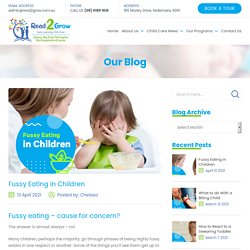
The answer is almost always – no! Many children, perhaps the majority, go through phases of being highly fussy eaters in one respect or another. Some of the things you’ll see them get up to will border on the bizarre, like insisting on dry cereal only or refusing to have more or less than a specified number of raisins on their plate. In the vast majority of instances, these are short-lived things and of no importance. However, in a few cases, fussy eating can become a more challenging problem. Fussy eating – causes There is no universal explanation for this. Early Learning Child Care Nollamara. There’s a fair chance that, sooner or later, you’re going to be shocked by your toddler suddenly using foul language.
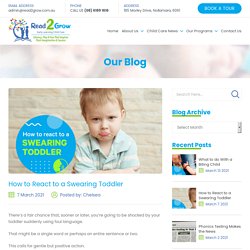
That might be a single word or perhaps an entire sentence or two. This calls for gentle but positive action. Why do toddlers swear? In fact, many don’t but quite a few do. They learn the words or sentences from: other children;other adults outside of the home who they might have heard swearing and cursing;TV, video games, some pop songs;older siblings or parental example. Toddlers are at an age where every other word is new to them.
Early Learning Child Care - Read 2 Grow. Seeing a child biting another can be very distressing.

It is not exactly common but it’s far from unknown and does not, in itself, signify behavioural problems. Why do children bite? Broadly speaking, children bite others for one of three reasons: they are not fully aware that this can cause pain and injury – this usually only applies to very young children and early toddlers;an otherwise harmless bit of rough-and-tumble play can get out of hand, leading to an instinctive bite reaction from a child;a child may go out of its way to bite another out of anger, during a fight, a temper tantrum or a desire to attract wider adult attention. In these cases, there is usually a clear intention to cause pain and distress though this might not be fully under the child’s control (as in a temper tantrum etc.). Each of these has its own implications and required responses. 10 Tips for Great Road Travel with Your Toddlers and Babies - Read 2 Grow. Travel with Your Toddlers and Babies Some parents approach a long road trip with young children with a sense of dread.

In one sense, that’s understandable. Children can demand lots of attention and energy – something that can be in short supply on a long car journey. So, here are our 10 tips for helping to make your travel with your toddlers or babies a little easier. Prepare OK, this is rather generic but it’s a fact that some of us don’t put the required thought and preparation in beforehand. That means the drive can become an almost endless series of minor emergencies and stops, many of which could have been avoided with a bit of forethought. So, take your pre-departure planning seriously. Take some toys It sounds obvious but it’s important. Read 2 Grow Early Learning - Read 2 Grow. It’s never too soon to start taking your children out to restaurants with you.
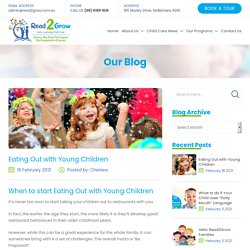
In fact, the earlier the age they start, the more likely it is they’ll develop good restaurant behaviours in their older childhood years. However, while this can be a great experience for the whole family, it can sometimes bring with it a set of challenges. The overall motto is “Be Prepared!”. Can you give your child too much positive attention? - Read 2 Grow. As experts in the child care industry, we’ve often heard questions related to the subject of “spoiling a child”.

So we thought we’d share the common questions that have come up over the years and what we believe is best for the child. Here they are in no particular order… Can I give my child too much positive attention? No, you can’t. It is as simple as that. Merry Christmas and a Healthy New Year! - Read 2 Grow. People usually take time to reflect on the year during these times so we thought we’d ponder a bit as well.

This time last year we were working on launching our centre and excited about what the year 2020 would bring. And suffice to say, it has been nothing short of “eventful”. If any of us felt a bit bored with the usual routines of the years passing by and the festivities that come around each year, this year has been a complete disruption. The year 2020 has taught people to look after themselves, spend more time with their loved ones and grow together as a community. So for the first year in running, we’ve seen amazing things in this community. We want to thank all our parents for supporting us during this year and all our frontline workers who are the unnamed heros of our society. What is a Healthy Screen time for Babies and Toddlers? - Read 2 Grow. Little is likely to get people angrier when debating how much time their children should be allowed to spend on a screen. There are those who would argue that screens are inherently bad for a younger child’s development and others who say that they have no effect whatsoever.
To make matters worse, there is surprisingly little hard science to back up many of the differing views. Studies have been done but they’re often inconclusive or subsequently contradicted by other studies. So, parents will need to use a lot of common sense here. We’ll offer our opinions that we hope will help. How to build positive relationships between parents and children. Let’s say at the very outset that discussing this isn’t easy! That’s because every single parent is different – and every single child likewise.
What works in one relationship might not in another. Stages for Bonding and Attachment in Babies. During the early years of childhood development, parental bond is key in establishing a safe and secure environment for babies. While most parents have a desire to bond and connect with their young ones, many struggle with exactly how to go about building a healthy relationship. This is particularly true when it comes to first time fathers and mothers. So here’s some tips we thought would help overcome the confusion or “awkwardness”. Toys That Really Aid Children's Learning. Children learn through play. It doesn’t really matter what they’re playing with, they’ll learn from it. For example, playing on an inflated slide teaches coordination and the less pleasant lesson that if you fall off things, it will hurt!
A spinning top helps hand-eye coordination and so on. However, there are some toys that have a strong evidence base for being particularly useful. How to Inspire a Love of Books in Your Children. Most of us want to see our children reading – and enjoying it. When will your Baby start Teething? Let’s say right up front that this question can’t be answered. That’s because just like most other elements of child development, there are huge variations. In fact, things will vary by baby and they might also be affected by your genetic background. So, our usual re-assuring message; please don’t worry if your baby is “different” to what follows”. Top Tips for Getting Your Child to Cooperate. 10 Popular Baby Food Recipes. If you plan to make your baby’s food yourself rather than rely on tinned and packet options, then here are some ideas about how to prepare some easy and nutritious meals for your little one. 10 Common Naptime Problems and Solutions.
Naptime can be a chance for parents to get a well-earned rest at the same time as their toddlers. However, it can also be stressful if the children object! Tips for Disciplining Your Toddler. When Should You Get Your Child's First Pet? Although there are some who argue that the day of the pet has passed and they have no place in an enlightened home, in reality, most of us still love them. Our children probably will do likewise. Toilet Training your Toddler. Little has caused as much fractious debate over the past 75 years as “how to toilet train children”. We should be clear – personal beliefs and practices vary hugely. Different cultures also have very different ideas and approaches in this controversial domain.
At the outset then, let’s be clear that there are not many absolute rights and wrongs here. 10 Ways for Dad to Bond with Baby. The world has changed. No longer is the typical mother a professional housewife. 3-Year-Old Behaviour Problems & What Is Normal. Baby and Infant Growth and Development Milestones. How to Keep Children Learning and Engaged at Home. Types of Music that Help Babies and Toddlers Develop. How Easily Do Toddlers Develop Language Skills? Top Tips on How to Read to Small Children. Tips to Stay Healthy During the Flu Season. Exciting News! Room Changes! - Read 2 Grow Early Learning. Read 2 Grow Early Learning Child Care. Read 2 Grow Early Learning Child Care. Read 2 Grow Early Learning Child Care. Read 2 Grow Early Learning Child Care. It’s finally here, we are open for business - Read 2 Grow. Read 2 Grow Early Learning Child Care. Read 2 Grow Early Learning Child Care. Read 2 Grow Early Learning Child Care.